新概念第三册第五课
新概念第三册第五课习题
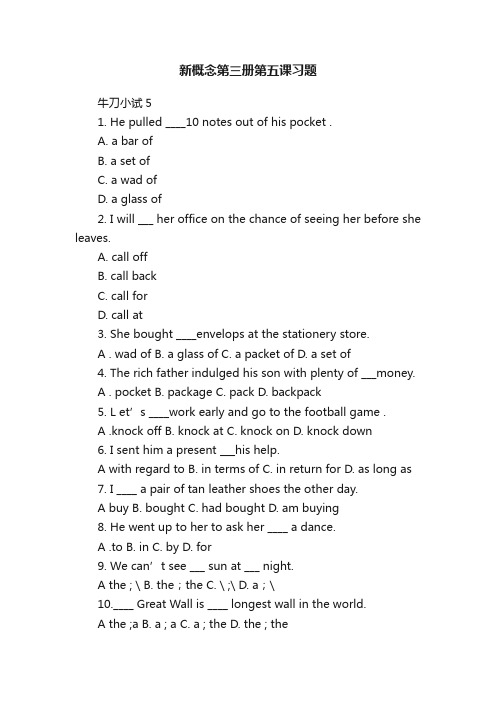
B. call back
C. call for
D. call at
3. She bought ____envelops at the stationery store.
A . wad of B. a glass of C. a packet of D. a set of
4. The rich father indulged his son with plentup to her to ask her ____ a dance.
A .to B. in C. by D. for
9. We can’t see ___ sun at ___ night.
A the ; \ B. the;the C. \ ;\ D. a;\
10.____ Great Wall is ____ longest wall in the world.
A the ;a B. a ; a C. a ; the D. the ; the
11.___ young should care for and help _____old.
A the ;a B. a ; the C. an; an D. the ; the
新概念第三册第五课习题
牛刀小试5
1. He pulled ____10 notes out of his pocket .
A. a bar of
B. a set of
C. a wad of
D. a glass of
2. I will ___ her office on the chance of seeing her before she leaves.
A . pocket B. package C. pack D. backpack
新概念英语第三册第5课时

T: the train left S1: Has the train left? S2:Yes, it has just left. It left a minute ago. eg. John arrived the taxi come the letter arrived
T: driven a car-last week S1: Have you ever driven a car yet? S2: Yes, I drove one last week.
Q: What does ‘no wrong numbers’ mean?
A: Pigeons are carrying the messages, so there are no mistakes.
1. Who has a garage in Silbury? 2. Where has he just bought another garage? 3. How far is Pinhurst from Silbury? 4. How many pigeons has he bought? 5. What happened yesterday? 6. What kinds of messages do they carry?
twelve pigeon a pigeon-carried the first message The bird-covered the distance Mr. Scott-has sent requests for spare parts
and messages He has began his private telephone service
T: Ask me if James has a garage in Silbury. S: Does James have a garage in Silbury? T: Ask me who has a garage in Silbury. S: who has a garage in Silbury? T: Ask me how far Pinhurst is from Silbury. S:How far is Pinhurst from at school a year ago had an accident-in 1996
新概念英语第三册 51-55 课后作文标准答案
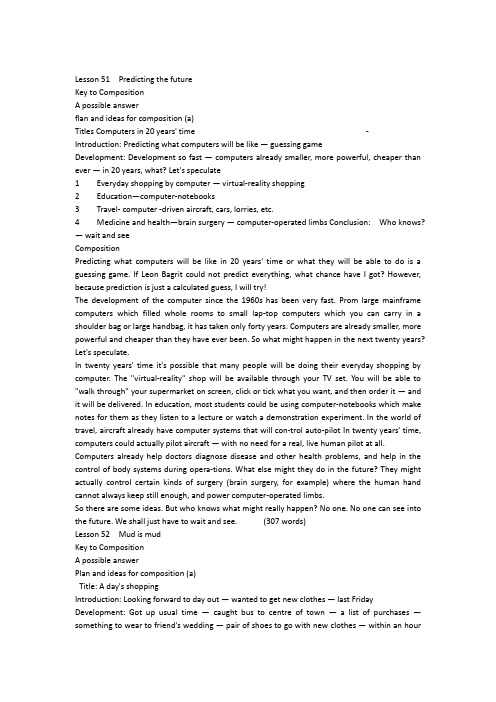
Lesson 51 Predicting the futureKey to CompositionA possible answerflan and ideas for composition (a)Titles Computers in 20 years' time - Introduction: Predicting what computers will be like — guessing gameDevelopment: Development so fast — computers already smaller, more powerful, cheaper than ever — in 20 years, what? Let's speculate1 Everyday shopping by computer — virtual-reality shopping2 Education—computer-notebooks3 Travel- computer -driven aircraft, cars, lorries, etc.4 Medicine and health—brain surgery — computer-operated limbs Conclusion: Who knows? — wait and seeCompositionPredicting what computers will be like in 20 years' time or what they will be able to do is a guessing game. If Leon Bagrit could not predict everything, what chance have I got? However, because prediction is just a calculated guess, I will try!The development of the computer since the 1960s has been very fast. Prom large mainframe computers which filled whole rooms to small lap-top computers which you can carry in a shoulder bag or large handbag, it has taken only forty years. Computers are already smaller, more powerful and cheaper than they have ever been. So what might happen in the next twenty years? Let's speculate.In twenty years' time it's possible that many people will be doing their everyday shopping by computer. The "virtual-reality" shop will be available through your TV set. You will be able to "walk through" your supermarket on screen, click or tick what you want, and then order it — and it will be delivered. In education, most students could be using computer-notebooks which make notes for them as they listen to a lecture or watch a demonstration experiment. In the world of travel, aircraft already have computer systems that will con-trol auto-pilot In twenty years' time, computers could actually pilot aircraft — with no need for a real, live human pilot at all. Computers already help doctors diagnose disease and other health problems, and help in the control of body systems during opera-tions. What else might they do in the future? They might actually control certain kinds of surgery (brain surgery, for example) where the human hand cannot always keep still enough, and power computer-operated limbs.So there are some ideas. But who knows what might really happen? No one. No one can see into the future. We shall just have to wait and see. (307 words)Lesson 52 Mud is mudKey to CompositionA possible answerPlan and ideas for composition (a)Title: A day's shoppingIntroduction: Looking forward to day out — wanted to get new clothes — last Friday Development: Got up usual time —caught bus to centre of town —a list of purchases —something to wear to friend's wedding — pair of shoes to go with new clothes — within an hourhad most important things on list Then most difficult part of day — "Birthday present for Pat" —a book Spent 2 hours in one large book shop — failed — bought three for self!Conclusion: How I felt when I got home CompositionFor me, a day's shopping is the best way I think of to pass a day away from college or work. I have been looking forward to a day out shopping for weeks because I have wanted to get some new clothes for ages, so last Friday I took a day off.I got up at the usual time (as if I were going to work or college) because for me shopping is as serious as work. Before I left the house I made sure I put on a good pair of walking shoes and then caught the bus into the centre of the town.Some people visit all the shops in the hope that they will find what they want at the prices they want to pay. Not me: I'm one of those shoppers who has a list of purchases — and with a fairly good idea of how much I want to pay.The first thing 1 wanted was something to wear to a friend's wedding next month — and I didn't want to pay very much- I found just what f wanted in the second shop I visited. And in the second shoe shop I visited, I found a pair of shoes that would go with the new clothes and which I could wear to work afterwards. Within an hour I had bought the most important things on my shopping list. I was so pleased!But then came the most difficult part of the day. The third thing on my shopping list was "Birthday present for Pat". I like to give her a present but it is always so difficult. This year, I decided, I would buy her a book. Do you know how long I spent in one large book shop? Two hours! And even then I didn't get her a book — although I bought three for myself IBy the time I got home, it was six o'clock. I was absolutely exhausted, but pleased that I had managed to buy two things on my list.(337 word)Lesson 53 In the public interestKey to CompetitionA possible answerPlan and ideas for composition (6)Title: The work of a policemanIntroduction: In Britain —people —different attitudes to police —generally appreciate them (not criminals!)What do police do?Development: Number of jobs in one:Traffics ;keeping the peace; solving crime; helping to keep order in emergencies — air crashes, fires, road accidents, etc. Conclusion: Police do excellent job — don't envy them Composition In Britain, people have different attitudes to the police. Most people generally appreciate them and the job they do — although there. are certain people (including criminals, of course) who do not believe that the police should have the power that they do.What does a policeman actually do? It is not an easy job to describe. After all, a policeman has a number of jobs in one. A policeman often has to control traffic, either on foot in the centre of a town, or in a police car on the roads. Indeed, in Britain, he might be in the Traffic Police and spend all, or a lot of, his time driving up and down main roads and motorways. A traffic policeman has to help keep the traffic moving, stop speeding motorists and help when there is anaccident. 'A policeman has to help keep the peace, too. If there is a fight or some other disturbance, we expect the police to come and assess the situation and restore order. And they often have to deal with situations at great risk to themselves and their own safety.We expect the police to solve crimes, of course, so an ordinary policeman, even if he is not a detective, will often have to help look for and arrest criminals.And who do we call when there is an emergency —an air crash, a fire, a road accident, or a burglary? We call the police. So a po-liceman has to be prepared to face any unpleasant emergency that may happen in the modern world.The police do an absolutely necessary job, they do it extremely well and I support them, but I do not envy policemen. 1 do not think that 1 could ever do the job of a policeman. (296words)Lesson 54 Instinct or cleverness?Key to CompositionA possible answerPlan and ideas for composition (b)Title: Our efforts to control pestsIntroduction: What are "pests"? — see dictionary definition — always been difficult to control or exterminate themDevelopment: Insects: ants, wasps, locusts, (plague), beetles that damage woodwork. . . damage property, devour our crops, . . . —other pests —mice, rats —eat food —spread disease —efforts to control pests — insecticides and pesticides — poison —traps . . . . , . . . . , .For farmers, even certain birds are pests — gulls, pigeons, etc. — follow at sowing time and eat seeds —' scarecrows to frighten birdsConclusion: Tried almost everything — some pests held in check other still a major problem (e. g. locusts) . .CompositionAccording to my dictionary, "pests" are "small animals or. insects that harm or destroy food supplies". But, for me, they are more than that: they are insects and small animals that spread disease and damage property, too. Whatever they do and however you define them, pests have been a major problem to man throughout history. Man has tried to control or exterminate these creatures, but neverwith very much success.In some ways, insects are the worst pests. Ants, locusts and beetles damage property, woodwork, crops and harvest, and. in this century we have sprayed crops with insecticides and pesticides to protect them from insects. The problem now is that there are some in-sects that have become immune to pesticides. Rats and mice eat our food supplies too and spread disease, and people have tried to kill or catch them with poison or traps. But again, they are still with us- We. haven't managed to exterminate them.Let's not forget, however, that for farmers, certain birds are "pests" too. In Britain, seagulls, pigeons and other birds often fly down in their hundreds (or even thousands) to pick up seeds when farmers are planting crops. Years ago, fanners used to stand scare- crows in the fields to frighten away birds, but I'm not sure how effective they were.We have tried different things, then, to control pests, and we have managed to hold some pests in check. However, some are a big problem, both in the major industrial nations and in the Third World. While locusts are a terrible problem in countries like Sudan and Ethiopia, rats are still a problem in most large cities in the world. We might control pests to a certain extent, but we shall never get . rid of them. (292words)Lesson 55 From the earth: GreetingsKey to Composition.A possible answerPlan and ideas fair composition (a)Title: ExtraterrestrialsIntroduction: Remember "ET"? Ideas about extraterrestrialsDevelopment: But creatures with incredible intelligence and no form? How deal with them? Not benevolent? Stories of extraterrestrials aliens landing —have scientists studied them? Extraterrestrials helping scientists? Stories just rumours?Conclusion: Extraterrestrials out there in space? Perhaps one day we'll know: change our view of everything CompositionDo you remember ET in the Film ET, the Extraterrestrial'! If you do, you will know that the common picture of extraterrestrials is that they will look rather strange —for instance, they might have big eyes and funny feet and be a strange colour — but they will still somehow look like living creatures from earth. At the same time, of course, we believe that they will probably have incredible powers —like ET's power to heal injuries and to come alive again. Many science-fiction stories and films have shown aliens or extraterrestrials like this. They may somehow look like strange earth creatures, therefore, but they are benevolent.But what if extraterrestrials —beings from other planets —are creatures with incredible intelligence and with no form, that is, with no body form like earthly creatures? They might be almost "living thoughts''. How would we greet them? How would we deal with them? And what if they are not benevolent? In other words, what if they really want to take over the earth?There are stories that extraterrestrials or aliens have already crashed on earth m spacecraft (flying saucers) and that scientists have studied them. There are even more fantastic stories that scientists are already learning from extraterrestrials new knowledge which will help us build incredible spacecraft to fly to other planets and beyond. Stories like that must surely be just rumours.Perhaps one day we will know if there really are extraterrestrials out there in space, and if there are, we will know what they look like and what they think of us. Will they really be little green men? Or will they be giants? Or perhaps they will be so small that we can hardly see them? Will they be friendly? Or will they want to take over the earth? Who knows? One thing is certain. If we were ever to discover that there are extraterrestrials out there, the discovery would completely change our view of the universe and ourselves.(329 words)。
新概念第五课
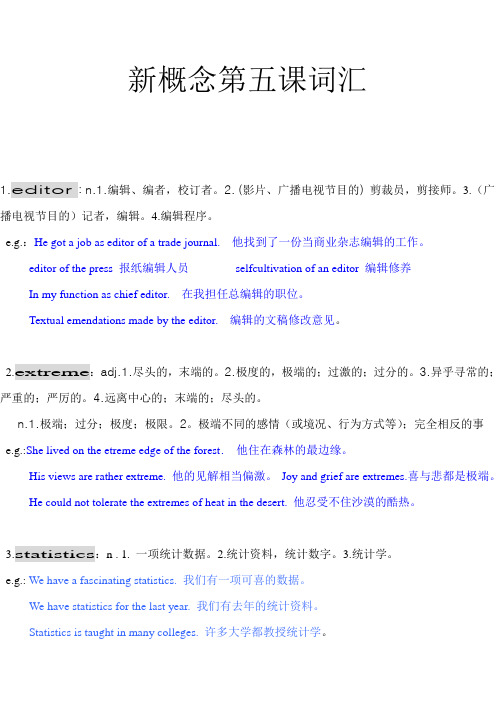
新概念第五课词汇1.editor : n.1.编辑、编者,校订者。
2. (影片、广播电视节目的) 剪裁员,剪接师。
3.(广播电视节目的)记者,编辑。
4.编辑程序。
e.g.:He got a job as editor of a trade journal. 他找到了一份当商业杂志编辑的工作。
editor of the press 报纸编辑人员selfcultivation of an editor 编辑修养In my function as chief editor. 在我担任总编辑的职位。
Textual emendations made by the editor. 编辑的文稿修改意见。
2.extreme:adj.1.尽头的,末端的。
2.极度的,极端的;过激的;过分的。
3.异乎寻常的;严重的;严厉的。
4.远离中心的;末端的;尽头的。
n.1.极端;过分;极度;极限。
2。
极端不同的感情(或境况、行为方式等);完全相反的事e.g.:She lived on the etreme edge of the forest. 他住在森林的最边缘。
His views are rather extreme. 他的见解相当偏激。
Joy and grief are extremes.喜与悲都是极端。
He could not tolerate the extremes of heat in the desert. 他忍受不住沙漠的酷热。
3.statistics:n . 1. 一项统计数据。
2.统计资料,统计数字。
3.统计学。
e.g.: We have a fascinating statistics. 我们有一项可喜的数据。
We have statistics for the last year. 我们有去年的统计资料。
Statistics is taught in many colleges. 许多大学都教授统计学。
新概念3第五课
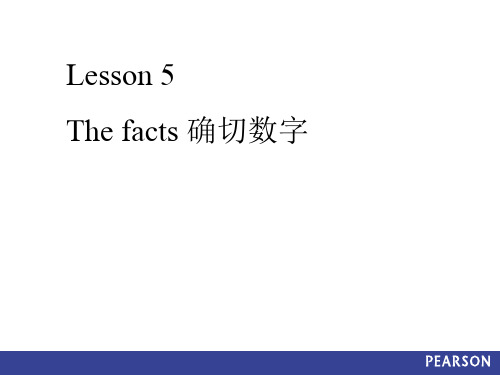
Lesson 5 The facts 确切数字
Editor: • Edition: • 1.版本
n.
a particular version of a book, magazine or newspaper • 2.版次 The second edition was published only in Canada.
2>含有not的副词短语位于句首, 句 子要倒装。 not for a second / not in the least / not for an instant 绝不, 一点也不
-- Not in the least is he interested in English literature. -- Not for an instant did I believe he had lied.
• • •
3.send for… 派人去请,召唤;订购 Leave this house now, or I’ll send for the police. You can send for the furniture at a very cheap price.
倒装: 1>否定副词位于句首, 要倒装。 never, seldom, rarely, little, hardly, scarcely, nowhere, no sooner -- Never have I read such stories. 我从来也没读过这样的小说。 -- Nowhere can he find the book he wants. 无论在哪他也找不到他要的书。
新概念英语第三册课文(全60课).
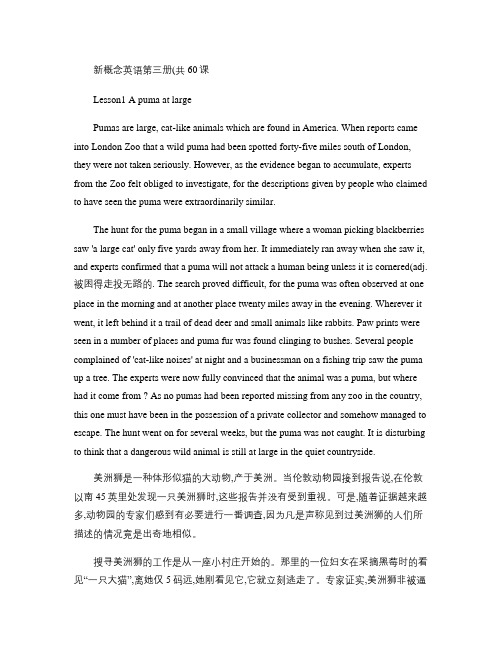
新概念英语第三册(共60课Lesson1 A puma at largePumas are large, cat-like animals which are found in America. When reports came into London Zoo that a wild puma had been spotted forty-five miles south of London, they were not taken seriously. However, as the evidence began to accumulate, experts from the Zoo felt obliged to investigate, for the descriptions given by people who claimed to have seen the puma were extraordinarily similar.The hunt for the puma began in a small village where a woman picking blackberries saw 'a large cat' only five yards away from her. It immediately ran away when she saw it, and experts confirmed that a puma will not attack a human being unless it is cornered(adj.被困得走投无路的. The search proved difficult, for the puma was often observed at one place in the morning and at another place twenty miles away in the evening. Wherever it went, it left behind it a trail of dead deer and small animals like rabbits. Paw prints were seen in a number of places and puma fur was found clinging to bushes. Several people complained of 'cat-like noises' at night and a businessman on a fishing trip saw the puma up a tree. The experts were now fully convinced that the animal was a puma, but where had it come from ? As no pumas had been reported missing from any zoo in the country, this one must have been in the possession of a private collector and somehow managed to escape. The hunt went on for several weeks, but the puma was not caught. It is disturbing to think that a dangerous wild animal is still at large in the quiet countryside.美洲狮是一种体形似猫的大动物,产于美洲。
新概念英语第五课
新概念英语第五课 Nice to meet you 很高兴见到你Goog morning ! 早上好Goog morning! Mr. blake. 早上好布莱克先生This is miss sophie dupont . 这是苏菲娅杜邦Sophie is a new student. 她是一个新学生She is French. 她来自法国Sorhie this is hans . 苏菲这是汉斯He is German . 他是德国人Nice to meet you . 见到你很高兴And this is Naoko. 还有这个是直子She is Japanese . 她是日本人Nice to meet you . 见到你很高兴And this is Chang Wu. 这是昌宇He is Korean. 他是韩国人Nice to meet youAnd this is Luming . 这是鲁明He is Chinese . 他是中国人(在国家前面不用+冠词)Nice to meet you.And this is xiaohui 这是小惠She is Chinese . too 她也是中国人(TOO “也”肯定句中用,一般用于句末)Nice to meet you .1、Miss 用于未婚小姐的尊称要加姓名Madam 用于未婚小姐尊称但是后面不加姓名2、Mrs. 女士(夫人)Mr.先生3、Nice to meet you = glad to meet you =please to meet you 很高兴见到你非正式的场合How do you do 你好用于第一次与陌生人见面How are you 你怎样用于熟人之间见面4、she 发音的时候要发长元音5、too 用于肯定句中,一般用于句末either用于否定句中,一般用于句首6、在国家前面不用+冠词、专用名词前面要加+the 是特指、7、定冠词the发// 2种音在元音开头和辅音开头是有区别的a cup of tea please 请来一杯茶。
新概念第三册(全套)课文讲解和笔记
Lesson 01 A Puma at large 逃遁的美洲狮New words and expression 生词和短语学习词汇时仅知道汉语语义是不够的,要把单词放在语句中体会其应用学习关键句结构是则要把它放在段落结构或文章里puma n.美洲狮spot v.看出, 发现??= see, pick out, recognize, catch sight of 强调结果, 辨别出, 看见, 识别, 发现-- A tall man is easy to spot in the crowd.-- He has good eye for spotting mistakes.同意词:-- find:强调发现的结果/ find?out:查出事实真相-- discover:做出重大发现/ notice:注意到-- observe:观察/ watch:观察活动中的人或画面Spot n.斑点-- There is a white spot on the shirt.on the spot 有两个含义:1> 立刻, 马上(at?once, immediately)-- Anyone breaking the rules will be asked to leave on the spot. 2> at?the?place?of?the?action 在现场-- Wherever she is needed, she is quickly on the spot.Evidence n.证据(不可数名词)Evident adj.明显的, 显然的/ evidently adv.明显地, 显然Evidence = proof (n.证据)-- When the police arrived, he had already destroyed the evidence.in?evidence 显而易见的-- He was in evidence at the party.Accumulate v.积累, 积聚(强调积累的过程)-- As the evidence accumulates, experts from the zoo felt obliged to investigate.Gather vt.聚集, 把某人召集在某处-- The teacher gathered his students in the classCollect vt.搜集, 采集-- Do you collect stamps? Yes, I collect stamps as my hobby.(n.业余爱好)Assemble v.集合, 集会/ 装配-- A large number of people assemble on the square.Hoard vt.大量的储存(-- hoard?up = store?up 储藏)-- The squirrel hoards up nuts for the cold winter (squirrel n.松鼠)nut n.坚果)amass vt.积聚(主要用于诗歌和文学作品)-- The clouds amassed above the hillsOblige v.使…感到必须feel?obliged?to?do?sth 感觉有必要做某事-- I feel obliged to say no to his demand(n.要求, 需要)be?obliged?to?do?sth 被迫做某事-- They were obliged to sell their car to pay their debts off.(debt n.债务)hunt v.n.追猎, 寻找(hunt for)-- The experts from London zoo began to hunt (v.) for a puma.-- The hunt (n.) for the puma proved the difficult. (prove vt.证明, 证实)search 搜寻某处为了寻找到某人或某物-- The police were searching the forest for the missing boy.run?after 强调追赶, 追求-- look, a dog is running after a cat-- what are you run after in your lifeseek = pursue? v.追寻(理想)chase v.追赶(-- They are chasing a thief / They are running after a thief)blackberry n.黑莓/ berry n.浆果human?being 人类corner v.使走投无路, 使陷入困境作为动词, 经常使用被动语态-- The thief was cornered at last-- The problem cornered me.corner n.角落-- at the corner of the street-- in the corner of the room-- on the corner of the deskTrail n.一串, 一系列trail vt. 跟踪, 追踪(= follow)-- The police trailed the criminal to the place where he was hiding (criminal n.罪犯)Print n.印痕Cling v.粘(clung, clung, clinging)-- She is always clinging to her mother.-- He clung to the hope that he would succeed. 他怀有成功的希望stick? v.粘住(-- stick the envelop)n.信封stick?to?坚持(-- stick to the plan / stick to one’s promise)n.许诺文案大全sticky? adj.粘的(-- sticky fingers)convince v.使…信服1>convince sb of sth-- I convince him of my honesty.(n.诚实, 正直)我使他相信我的诚实。
新概念英语第三册(中英文对照)
Lesson1 A puma at largePumas are large, cat-like animals which are found in America. When reports came into London Zoo that a wild puma had been spotted forty-five miles south of London, they were not taken seriously. However, as the evidence began to accumulate, experts from the Zoo felt obliged to investigate, for the descriptions given by people who claimed to have seen the puma were extraordinarily similar.The hunt for the puma began in a small village where a woman picking blackberries saw 'a large cat' only five yards away from her. It immediately ran away when she saw it, and experts confirmed that a puma will not attack a human being unless it is cornered (adj.被困得走投无路的). The search proved difficult, for the puma was often observed at one place in the morning and at another place twenty miles away in the evening. Wherever it went, it left behind it a trail of dead deer and small animals like rabbits. Paw prints were seen in a number of places and puma fur was found clinging to bushes. Several people complained of 'cat-like noises' at night and a businessman on a fishing trip saw the puma up a tree. The experts were now fully convinced that the animal was a puma, but where had it come from ? As no pumas had been reported missing from any zoo in the country, this one must have been in the possession of a private collector and somehow managed to escape. The hunt went on for several weeks, but the puma was not caught. It is disturbing to think that a dangerous wild animal is still at large in the quiet countryside.美洲狮是一种体形似猫的大动物,产于美洲。
新概念第五课
Lesson 5 No wrong numbers 无错号之虞Pigeon – n. 鸽子Message – n. 信息,口信【搭】leave sb. a message 给某人留一个口信(打电话用语):May I leave my father a message?我能给我父亲留个口信?Take a message for / to sb. 给某人捎一个口信?(经常用在口语中):——Could you take a message for me? 你能为我捎个口信吗?——Yes, I can take a message for you. 好的,我能为你捎个口信。
【辨】message,information,news,communicationMessage“信息”,可是名词:a message 一条信息;information “信息”,不可数名词:a piece/ bit of information 一条信息;a message 一条信息;information “信息”,不可数名词:a piece / bit of information 一条信息;news“消息”,不可数名词:a piece/ bit of news 一条消息;communication “通信,联络“,指一般的交流。
Cover – v. 覆盖;走过,越过;监视:The ground is covered with leaves. 地面被树叶覆盖着。
/ The police are covering all exits out of town. 警察已监视住出城的所有出口。
n. 封面;盖子:cover girl 封面女郎;bowl cover杯盖distance – n. 距离;远方:distance call 长途电话;keep sb. at a distance 与某人保持一段距离【补充学习】部分名词去词尾ce加t 变成形容词:Distance去ce+t = distant 遥远的Importance去ce+t= important重要的Request – n. 要求【搭】have a request for : 需求,对……有请求:The beggar had a request for some rice. 乞丐要了点饭吃。
- 1、下载文档前请自行甄别文档内容的完整性,平台不提供额外的编辑、内容补充、找答案等附加服务。
- 2、"仅部分预览"的文档,不可在线预览部分如存在完整性等问题,可反馈申请退款(可完整预览的文档不适用该条件!)。
- 3、如文档侵犯您的权益,请联系客服反馈,我们会尽快为您处理(人工客服工作时间:9:00-18:30)。
Lesson 5 The facts 确切数字Listen to the tape then answer the question below.听录音,然后回答以下问题。
What was the consequence of the editor's insistence on facts and statistics?Editors of newspapers and magazines often go to extremes to provide their readers with unimportant facts and statistics. Last year a journalist had been instructed by a well-known magazine to write an article on the president's palace in a new African republic. When the article arrived, the editor read the first sentence and then refused to publish it. The article began: ‘Hundreds of steps lead to the high wall which surrounds the president's palace. ’The editor at once sent the journalist a fax instructing him to find out the exact number of steps and the height of the wall.The journalist immediately set out to obtain these important facts, but he took a long time to send them. two more faxes, but received no reply. He sent yet another fax informing the journalist that if he did not reply soon he would be fired. When the journalist again failed to reply, the editor reluctantly published the only had the poor man been arrested, but he had been sent to prison as well. However, he had at last been allowed to send a fax in which he informed the editor that he had been arrested while counting the 1, 084 steps leading to the fifteen-foot wall which surrounded the president's palace. New words and expressions生词和短语editor(1. 1)/'edit+/ n.编辑publish(1. 6) /'p)bli M/ v.出版extreme(1. 1) /ik'stri:m/n.极端fax(1. 7) /f$ks/ n.传真statistics(1. 2) /st+'tistiks/ n.统计数字impatient(1. 10) /im'pei M+nt/adj. 不耐烦的journalist(1. 3) /'d{*:n+list/ n.新闻记者fire(1. 12) /'fai+/v.解雇president(1. 4) /'prezid+nt/n.总统originally(1. 13) /+'rid{in+li/adv.起初,原先,从前palace(1. 4) /'p$lis/ n.王宫;宏伟的住宅Notes on the text课文注释1 go to extremes. 走极端。
2 provide…with…作“向……提供……”解。
3 to write an article on, 写一篇有关的报道。
4 lead to …作“通往……”、“导致……”解5 go to press, 付印。
6 Not only had the poor man been arrested, but he had been sent to prison as well. 这是not only…but…as well 引导的并列句子,如果将not only置于句首,后面主谓语应采取倒装结构。
参考译文报刊杂志的编辑常常为了向读者提供成立一些无关紧要的事实和统计数字而走向极端。
去年,一位记者受一家有名的杂志的委托写一篇关于非洲某个新成立共和国总统府的文章。
稿子寄来后,编辑看了第一句话就拒绝予以发表。
文章的开头是这样的:“几百级台阶通向环绕总统府的高墙。
”编辑立即给那位记者发去传真,要求他核实一下台阶的确切数字和围墙的高度。
记者立即出发去核实这些重要的事实,但过了好长时间不见他把数字寄来。
在此期间,编辑等得不耐烦了,因为杂志马上要付印。
他给记者先后发去两份传真,但对方毫无反应。
于是他又发了一份传真,通知那位记者说,若再不迅速答复,将被解雇。
但记者还是没有回复。
编辑无奈,勉强按原样发稿了。
一周之后,编辑终于接到了记者的传真。
那个可怜的记者不仅被捕了,而且还被送进了监狱。
不过,他终于获准发回了一份传真。
在传真中他告诉编辑,就在他数通向15英尺高的总统府围墙的1,084级台阶时,被抓了起来。
Summary writing摘要写作In not more than 80 words describe what happened from the time the journalist set out to get the facts. Do not include anything that is not in the last paragraph.Answer these questions in note form to get your points:1 Did the journalist immediately set out to get the facts after receiving instructions from his editor or not?2 Did he send them at once or not?3 Was the editor getting impatient or not?4 How many faxes did the editor send?5 What did the editor threaten to do?6 Was the last fax answered or not?7 Was the article omitted from the magazine, or was it printed in its original form?8 When did the journalist send a fax?9 Why had he been imprisoned?Vocabulary词汇instructed(1. 3); well-known(1. 3); publish(1. 6); surrounds(1. 7); fired(1.12); reluctantly(1. 12).Composition作文Describe how the journalist was arrested and what happened afterwards. Expand the following into a paragraph of about 150 words.The journalist counted the number of steps as he…On arriving outside the main gate, he…He then…in order to measure the wall. While he was busy measuring the wall, a policeman…Though the journalist…, the policeman refused to believe him. He was arrested and sent to prison because the police thought that…When the journalist…he made things worse for himself. This proved to the police that…(69 words)Letter writing书信写作Write a letter of about 80 words to a friend who has recently got married. You read about the wedding in your local paper. Supply a suitable Introduction and Conclusion. Use the following ideas to write thePurneighbourhood----hope to see them soon.Key structures关键句型A, The and Some. (IKS 78) (参见第2册第78课关键句型)Exercises练习A Underline the words a(n) and the in the passage and note how they have been used.B Write sentences using the following words and phrases:1 Hudson river.2 information.3 cinema.4 industry.5 flour and milk.6 newspaper.Special difficulties难点Not only had the poor man been arrested…(11. 13-14)在英文中,如果表示否定的副词或副词词组放在句首,就必须后接“助动词+ 主语+ 句子的其他部分”。
